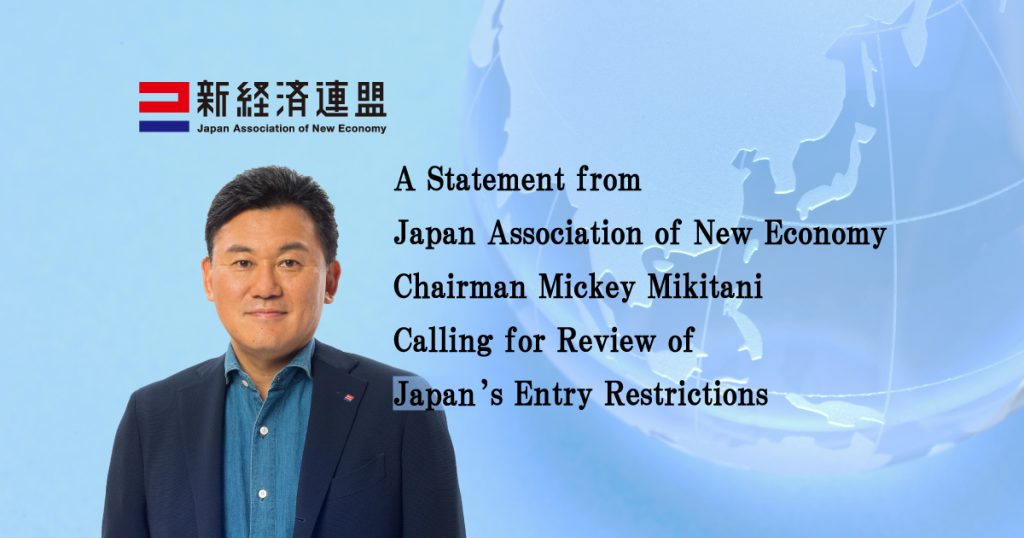- HOME
- Proposals/News
- Representative Director
- A Statement from Japan Association of New Economy Chairman Mickey Mikitani Calling for Review of Japan’s Entry Restrictions
A Statement from Japan Association of New Economy Chairman Mickey Mikitani Calling for Review of Japan’s Entry Restrictions

August 17, 2020
A Statement from Japan Association of New Economy Chairman Mickey Mikitani
Calling for Review of Japan’s Entry Restrictions
Japan Association of New Economy (JANE) is an active advocate for policy intended to bring non-Japanese talent into Japan in order to drive innovation through diversity of talent, address labor shortages and create new demand.
In order to address the COVID-19 pandemic, the Japanese government’s current stance is to deny entry into Japan of foreign nationals from almost all countries, with few exceptionsⅰ. If this stance continues into the long term, not only will Japan sacrifice new business opportunities and access to knowledge and expertise, we are also at risk of being perceived as a society that does not welcome foreign nationals within our borders, potentially damaging our appeal over the mid to long term and causing innovation itself to stagnate. In light of these risks, on behalf of JANE, I would like to share the following comments.
- JANE is an active advocate for policy intended to bring non-Japanese talent into Japan in order to drive innovation through diversity of talent, address labor shortages and create new demand.
- In order to address the COVID-19 pandemic, the Japanese government’s current stance is to deny entry into Japan of foreign nationals from almost all countries, with few exceptionsⅰ. Even those with permanent resident status, spouses and immediate family members of Japanese nationals or permanent residents, and other holders of residency permits based on their ethnic or family status are no exception.
As a result of these restrictions, not only is it extremely difficult for foreign nationals to visit Japan for business or study purposes, but foreign nationals who have made Japan their home and base of activities in order to make a significant contribution to Japanese society are also facing severe restrictions. If they temporarily depart Japan, they are no longer able to re-enter the country, with few exceptions.
- If this stance continues into the long term, not only will Japan sacrifice new business opportunities and access to knowledge and expertise, we are also at risk of being perceived as a society that does not welcome foreign nationals within our borders, potentially damaging our appeal over the mid to long term and causing innovation itself to stagnate.
Among the G7 countries, Japan is the only country with entry restrictions so severe that they include foreign nationals with permanent residency or similar statusⅱ . Additionally, countries and regions across Asia that have had relative success in containing COVID-19 are not imposing entry restrictions of this severity. It may also be said that the appropriate use of measures such as PCR testing and tracking applications can significantly minimize the potential risk of infection created by any easing of entry restrictions on foreign nationals with permanent residency or similar status.
- In light of the above concerns, we appeal to the Japanese government to take the following measures.
✓ Move swiftly to improve the capability of PCR tests upon arrival and, as soon as possible, ease the entry restrictions for foreign nationals with permanent resident status or similar residency permits based on ethnic or family status to the same level as those for Japanese nationals.
✓ In addition to the above measures, while continuing to monitor the progress of COVID-19 inside and outside Japan, as well as the capability of PCR tests upon arrival, gradually extend the easing of entry restrictions to those with working visas, students studying abroad in Japan and others.
✓ Accelerate negotiations with other countries to expand the “Business Track” and “Residence Track” programs and open these programs for applications from relevant countries as soon as possible.
✓ Continue the programs being implemented to support foreign nationals staying in Japan by extending the periods of their current residence permits and helping them move from industries with declining demand to industries with growing demand, as well as provide the necessary supportⅲ to foreign nationals in accordance with their residency status in order to ensure Japan is continued to be recognized as a welcoming nation for foreign nationals.
ーーーーーーーーーーーーーーーーーーーーーーーーーーーーー
ⅰ The denial of landing is applicable to foreign nationals who have resided in countries/regions subject to denial of landing within 14 days prior to their application for landing in Japan. The number of countries/regions subject to denial of landing is 146 as of July 24, 2020. Aside from general international flights, a “Business Track” and a “Residence Track” will be established for addressing the need for personnel and other business needs. The “Business Track” and “Residence Track” will be used on a trial basis, subject to additional quarantine measures, to enable two-way traffic. The Japanese government has already begun to accept applications for the “Residence Track” between Thailand and Vietnam.
ⅱ In the G7 countries, the United Kingdom has already lifted entry restrictions for all countries (restrictions on post-arrival activities have remain unchanged). Even among countries that continue to impose entry restrictions, there are no restrictions on the entry of permanent residents. In many countries, skilled workers and international students are allowed to enter the countries.
ⅲ On May 22, 2020, JANE published a proposal entitled “The Impact of COVID-19 on Foreign Residents and Necessary Measures” and submitted it to the Japanese government.

